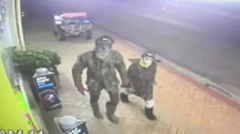Following a BBC Africa Eye investigation, human rights groups have intensified calls for accountability regarding the deaths of protesters at the hands of Kenyan security forces. The documentary revealed extensive violence against civilians during protests against new tax legislation, igniting public outrage and criticism of governmental responses.**
Calls for Accountability Heighten in Kenya Following BBC Investigation of Police Violence**

Calls for Accountability Heighten in Kenya Following BBC Investigation of Police Violence**
Human rights advocates demand justice after the release of a documentary connecting police and military personnel to the fatal shootings of protesters during anti-tax demonstrations in Nairobi.**
In the aftermath of a troubling BBC Africa Eye documentary, Kenya is seeing rising calls for thorough investigations into the actions of security forces during protests against a controversial finance bill enacted in June 2024. This investigation disclosed that members of the police and military were involved in the violent suppression of demonstrators, leading to the deaths of at least three unarmed protesters.
The documentary's revelations prompted Amnesty International and the Kenya Human Rights Commission (KHRC) to assert that officers identified in the footage must be held legally accountable. In contrast, Kenyan government spokespersons have downplayed the issue, condemning the documentary for lacking balance in its portrayal of events. “Those who did the documentary should have sought government opinion,” claimed Isaac Mwaura, emphasizing the need for fairness amid public outcry against police brutality.
Despite these claims, domestic and international responses have been overwhelmingly in favor of accountability. Using open-source data, the BBC identified several security personnel who allegedly fired upon protesters on the day lawmakers voted on the finance bill intended to raise approximately $2.7 billion in revenue. This decision spurred broad public dissent, and the subsequent police response claimed 65 lives, with many others reported missing.
The Kenyan public, fueled by anger from the findings of the documentary, is rallying behind efforts to petition for a public inquiry into the police's actions during the protests now referred to as the #OccupyParliament demonstrations. Human rights groups are emphasizing the need for transparency and justice for victims, as the police watchdog, the Independent Policing Oversight Authority (IPOA), has begun investigations—although no charges have yet been leveled against any officers.
Following the documentary's release, the IPOA disclosed that gunshot wounds accounted for 41 of the 60 deaths currently being investigated, raising serious concerns about excessive force employed by law enforcement. Reactions in the legislative arena have also been nuanced, with opposition leaders underscoring that violence against peaceful protesters can trace its origins to the upper echelons of government.
As the nation grapples with the fallout of these revelations, the debate surrounding the documentary’s impact continues to unfold—while pressures to silence dissenting voices in the media mount. Some senators have even suggested banning the BBC in Kenya, arguing that its content could incite further unrest.
In an era marked by significant youth activism and heightened scrutiny of governmental actions, the response to the BBC's findings may shape the dialogue on rights and accountability within Kenyan society well into the future.



















